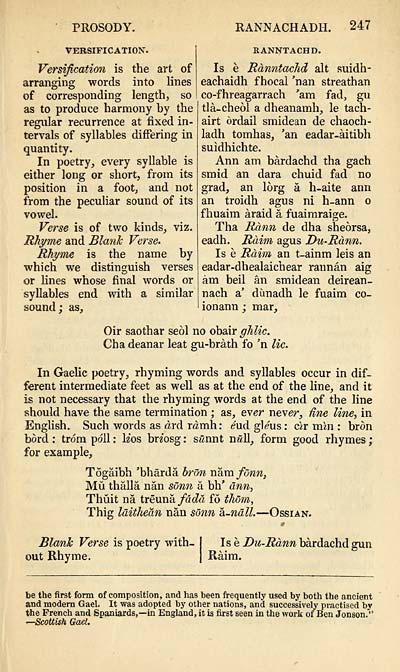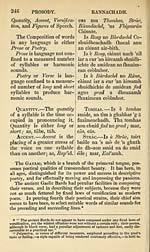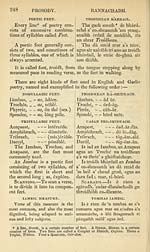Books and other items printed in Gaelic from 1841 to 1870 > Stéidhean a' Ghràmair Ghaëlig
(275) Page 247
Download files
Complete book:
Individual page:
Thumbnail gallery: Grid view | List view

PROSODY.
RANNACHADH. 247
VERSIFICATION.
Versification is the art of
arranging words into lines
of corresponding length, so
as to produce harmony by the
regnlar recurrence at fixed in-
tervals of syllables differing in
quantity.
In poetry, every syllable is
either long or short, from its
position in a foot, and not
from the peculiar sound of its
vowel.
Verse is of two kinds, viz.
Rhyme and Blanh Verse.
Rhyme is the name by
which we distinguish verses
or lines whose final words or
syllables end with a similar
sound ; as,
RANNTACHD.
Is è Rànntachd alt suidh-
eachaidh f hocal 'nan streathan
co-fhreagarrach 'am fad, gu
tlà-cheòl a dheanamh, le tach-
airt òrdail smidean de chaoch-
ladh tomhas, 'an eadar-àitibh
suìdhichte.
Ann am bàrdachd tha gach
smid an dara chuid fad no
grad, an lòrg à h-aite ann
an troidh agus ni h-ann o
fhuaim àraid à fuaimraige.
Tha Rànn de dha sheòrsa,
eadh. Ràim agus Du-Rànn.
Is è Ràim an t-ainm leis an
eadar-dhealaichear rannàn aig
àm beil àn smidean deirean-
nach a' dùnadh le fuaim co-
ionann ; mar,
Oir saothar seòl no obair ghlic.
Cha deanar leat gu-bràth fo 'n lic.
In Gaelic poetry, rhyming words and syllables occur in dif-
ferent intermediate feet as well as at the end of the line, and it
is not necessary that the rhyming words at the end of the line
should have the same termination ; as, ever never, Hne line, in
English. Such words as àrd ràmh: eud gleus : c^r mm : bròn
bòrd : trdm pdll : Hos br^'osg : swnnt nzlll, form good rhymes ;
for example,
Tògàibh 'bhàrdà bròn nàm fònn,
Mù thàllà nàn sònn à bh' ànn,
Thùit nà treunà fàdà fò thòm,
Thig làitheàn nàn sònn à-nàll. — Ossian.
Blank Verse is poetry with- 1 Is è Du-Rànn bàrdachd gun
out Rhyme. J Ràim.
be the first form of composition, and has been frequently used by both the ancient
and modera Gael. It was adopted by other nations, and successively practised by
the French and Spaniards,— in England, it is fìrst seen in the work of Ben Jonson."
—Scottish Gael.
RANNACHADH. 247
VERSIFICATION.
Versification is the art of
arranging words into lines
of corresponding length, so
as to produce harmony by the
regnlar recurrence at fixed in-
tervals of syllables differing in
quantity.
In poetry, every syllable is
either long or short, from its
position in a foot, and not
from the peculiar sound of its
vowel.
Verse is of two kinds, viz.
Rhyme and Blanh Verse.
Rhyme is the name by
which we distinguish verses
or lines whose final words or
syllables end with a similar
sound ; as,
RANNTACHD.
Is è Rànntachd alt suidh-
eachaidh f hocal 'nan streathan
co-fhreagarrach 'am fad, gu
tlà-cheòl a dheanamh, le tach-
airt òrdail smidean de chaoch-
ladh tomhas, 'an eadar-àitibh
suìdhichte.
Ann am bàrdachd tha gach
smid an dara chuid fad no
grad, an lòrg à h-aite ann
an troidh agus ni h-ann o
fhuaim àraid à fuaimraige.
Tha Rànn de dha sheòrsa,
eadh. Ràim agus Du-Rànn.
Is è Ràim an t-ainm leis an
eadar-dhealaichear rannàn aig
àm beil àn smidean deirean-
nach a' dùnadh le fuaim co-
ionann ; mar,
Oir saothar seòl no obair ghlic.
Cha deanar leat gu-bràth fo 'n lic.
In Gaelic poetry, rhyming words and syllables occur in dif-
ferent intermediate feet as well as at the end of the line, and it
is not necessary that the rhyming words at the end of the line
should have the same termination ; as, ever never, Hne line, in
English. Such words as àrd ràmh: eud gleus : c^r mm : bròn
bòrd : trdm pdll : Hos br^'osg : swnnt nzlll, form good rhymes ;
for example,
Tògàibh 'bhàrdà bròn nàm fònn,
Mù thàllà nàn sònn à bh' ànn,
Thùit nà treunà fàdà fò thòm,
Thig làitheàn nàn sònn à-nàll. — Ossian.
Blank Verse is poetry with- 1 Is è Du-Rànn bàrdachd gun
out Rhyme. J Ràim.
be the first form of composition, and has been frequently used by both the ancient
and modera Gael. It was adopted by other nations, and successively practised by
the French and Spaniards,— in England, it is fìrst seen in the work of Ben Jonson."
—Scottish Gael.
Set display mode to:
![]() Universal Viewer |
Universal Viewer | ![]() Mirador |
Large image | Transcription
Mirador |
Large image | Transcription
Images and transcriptions on this page, including medium image downloads, may be used under the Creative Commons Attribution 4.0 International Licence unless otherwise stated. ![]()
| Rare items in Gaelic > Books and other items printed in Gaelic from 1841 to 1870 > Stéidhean a' Ghràmair Ghaëlig > (275) Page 247 |
|---|
| Permanent URL | https://digital.nls.uk/101714899 |
|---|
| Description | Out-of-copyright books printed in Gaelic between 1631 and 1900. Also some pamphlets and chapbooks. Includes poetry and songs, religious books such as catechisms and hymns, and different editions of the Bible and the Psalms. Also includes the second book ever published in Gaelic in 1631. |
|---|

